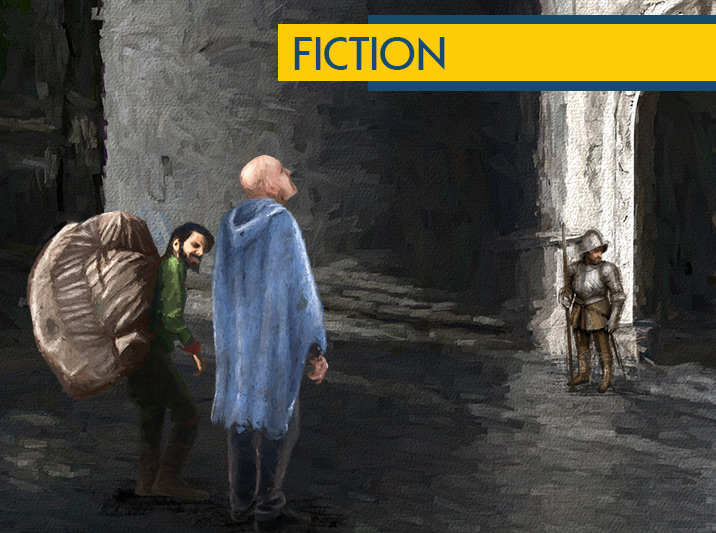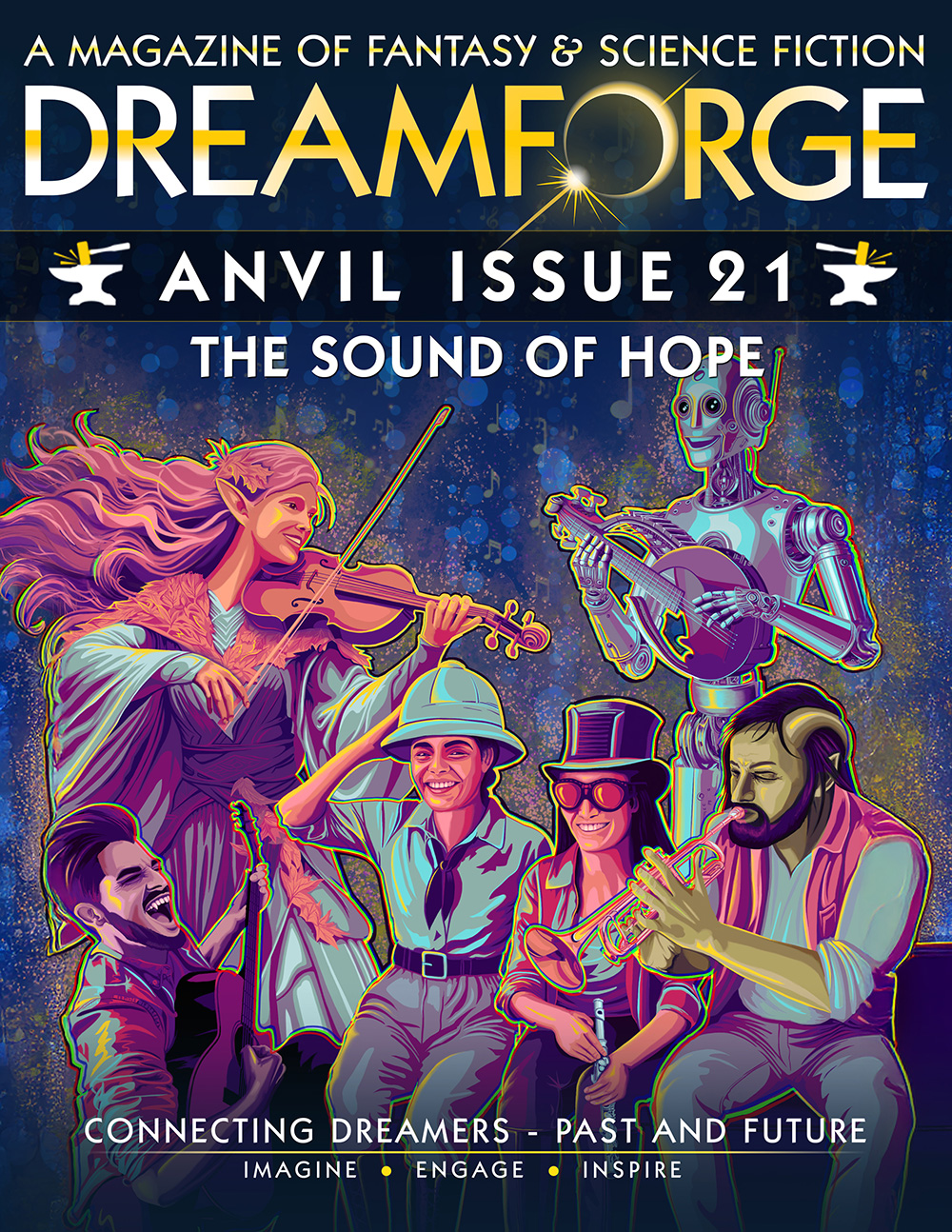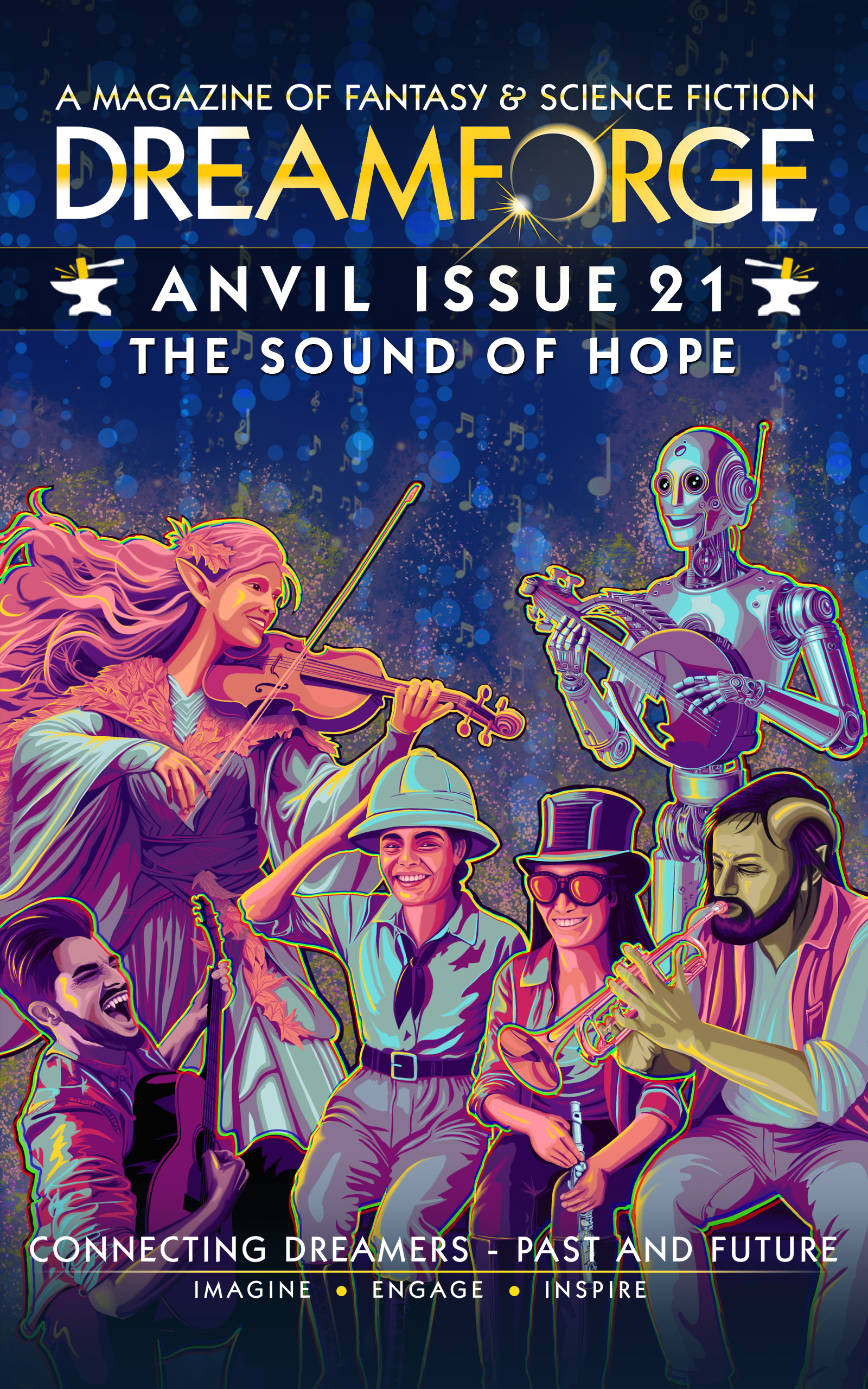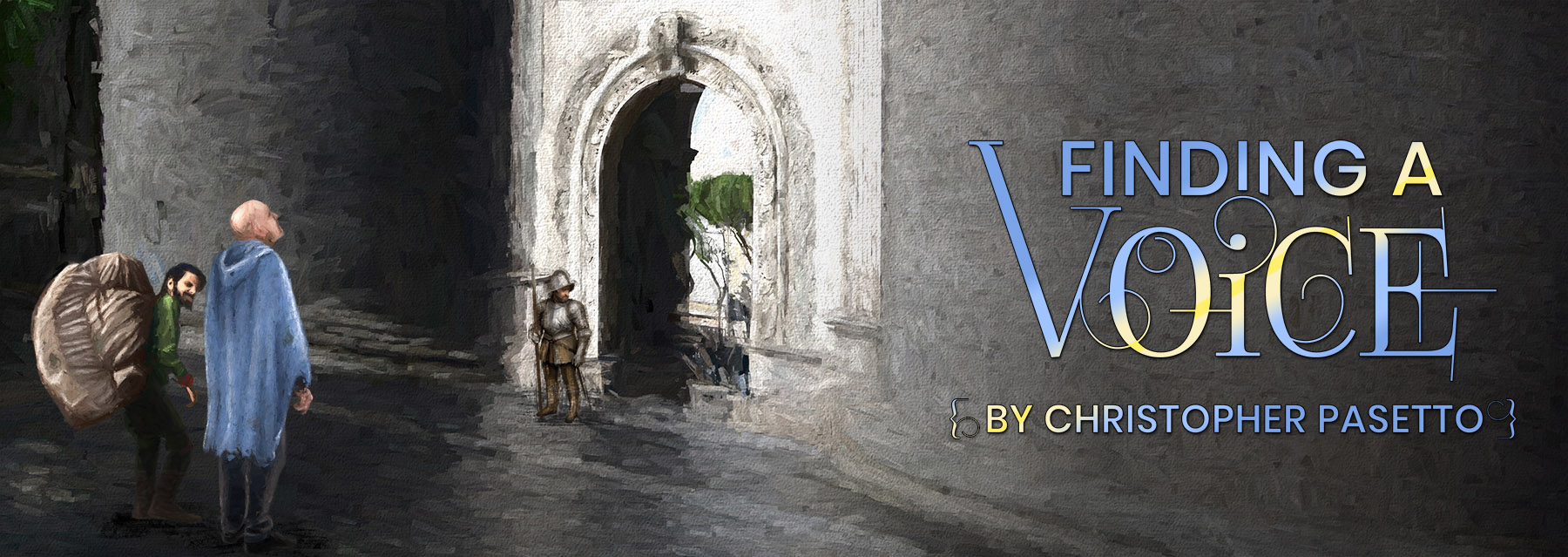
For Isabella…
You wouldn’t know it to look at him, but the old man skulking into Naples in the grey predawn hours was none other than Bolbec the Great, entertainer of royalty, traveling musician without equal, the finest unknown composer of this or any age. Also known as Bolbec the Trickster, sought after most keenly by officers of the Spanish Inquisition, and agents of the Papal Inquisition, and a host of offended nobles, disgruntled tavernkeepers, and evaded moneylenders throughout Europe. Also known as Bolbec the Magician, leaving a long trail of curious, disquieting, and often disastrous incidents wherever he performed. Also known as Bolbec the Master, with his bedraggled apprentice, Hendry, trotting along at his heels, struggling under the weight of a dozen instruments carefully wrapped in oil cloth, looking back over his shoulder every ten strides.That’s a lot of big names for a man who smells like old cheese and can’t seem to keep his finger out of his nose.
“What’s that?” Bolbec called over his shoulder, “Do you have something to say, boy?”
“No, master,” the apprentice called back.
Hendry shivered, coatless in the spitting rain. He’d been forced to leave it behind in some nameless mountain town when Inquisition agents nearly caught up with them. His feet hurt because of his stolen, too-small boots— his own properly sized boots were left behind in some nameless farming village when the villagers threw them out. Literally, picked them up and threw them over the wall. That was, of course, just after they fled the war in Portugal, the plague in Austria, the war in Portugal again, the famine in Germany, and Florence—
Can we just skip over Florence?
Suffice to say that Hendry’s apprenticeship seemed to be less a roster of performances and more a series of near escapes, accompanied by music.
Perhaps it was best then that their entrance into Naples went largely unnoticed. They avoided the main gate and instead passed into the city through a small crumbling portal in the old curtain wall, where an Italian soldier peered at them red-eyed from under the brim of his helmet but issued no challenge. Fog mixed with rain and rain mixed with fog in the early morning, a hazy, miserable brown light that gave their surroundings both the color and charm of Bolbec’s toenails. The old man led the way through winding back alleys, capering in the gloom and filth like it was a sunny field of flowers.
“The great city of Naples, boy!” He made a sweeping gesture towards the dilapidated buildings pressing in on either side as if they were palaces. “Jewel of Europe! Thriving center of commerce and culture! Haven for writers, artists, and of course musicians as other nations grow increasingly hostile and repressive. Perhaps here we will find your voice, boy!”
For years, Bolbec had been talking about “finding a voice” but Hendry still didn’t understand. Surely not a literal voice, as Hendry could speak… when he needed to. What then was he supposed to be looking for? As if somehow my voice exists elsewhere to be found, like a lost comb. Or coat.
Bolbec continued, “After decades of chaste chansons, boring ballads, and moldy motets we stand on the precipice of a great change!”
Wouldn’t that mean we’re about to go downhill?
“A great change!” Bolbec repeated, “A… what’s the word… a cataclysm? No no. Upheaval? Eruption?”
Poor choice considering the large volcano not far away.
“No matter!” cried Bolbec. He threw an arm around Hendry. “And from Naples…” he wiggled his fingers toward a distant horizon, “It’s off to Algiers, boy. Algiers. Just picture it…”
Hendry nodded, gulping. He didn’t know anything about Algiers, hadn’t the faintest idea how to begin picturing it. Bolbec may as well have told Hendry that their next destination would be the moon. Perhaps that’s where we’ll go when we’re inevitably forced to flee Algiers.
Dancing off, Bolbec hummed a happy tune, a wordless song which bounced between the alley walls, made the scabby bricks click and chitter in reply, each note richly resonating, rising—
CRASH
A rain gutter broke high above, dumping dirty water on Hendry. He had the presence of mind to hold the bundle of instruments away from his body but neglected to close his mouth.
He stood, spluttering, looking and feeling like a drowned rat. Bolbec regarded Hendry with pursed lips, as if considering how one might undrown a drowned rat.
Finally, the old man said, “Things could be worse, boy.”
“Oh really, master?” Hendry muttered, spitting, “How?”
“It could have dumped water on me.”
That’s when Hendry resolved to leave the old man, for real this time, the first chance he got.
Well, first chance within reason.
Back when Hendry was a boy… well, a much younger boy, the life of a minstrel seemed a grand musical adventure the way Bolbec painted it. Bolbec once played for Mehmed the Conqueror in Constantinople, upon a stage constructed from the bones of slain Byzantine soldiers. In Spain Bolbec performed a song to make dour King Ferdinand laugh and another to make pious Queen Isabella blush. He entertained a court of Habsburg royals and was forced to flee the city as they gradually caught onto his thinly veiled references to inbreeding and deformity. And that left out all the places between. The way Bolbec told it, everywhere the minstrel went folks showered him with food, gifts, and praise in equal measure. But over the past three years of his apprenticeship, Hendry found more often they were showered with indifference, insults, and rocks.
Of course, Bolbec never mentioned the rocks.
So Hendry was feeling particularly miserable as they came to a wide avenue, teeming with foot, horse, and carriage traffic. The rain slacked and the sun peered over the clouds, pouring golden light upon the city.
Hendry gaped.
Ahead lay the heart of Naples, a shining tableau of bright colors and soaring architecture. Grand palaces and imposing fortresses, bulging domes and slender steeples, fluted columns and towering arches ten men high, sculptures of great kings and queens alongside beasts of myth and legend. And everywhere signs of construction, the sketched beginnings of new structures to outshine the old ones.
Hendry could almost feel it, the great change Bolbec rambled about, the promise of better times just ahead. Then he spotted the Inquisition soldiers.
Of course, they’re here, too.
Hendry tried to usher Bolbec past the soldiers quickly. But the old man, oblivious as always, lingered at the door to a café, sniffing the air greedily. “Mmmm, smell that, boy? Smells like… sausages! Reminds me of Florence!”
Hendry groaned. “Can we please not talk about Florence?” Hendry’s stomach growled. He couldn’t remember his last decent meal. “Or food. We have no money.”
“Thbbbt!” Bolbec stuck out his tongue to blow a big raspberry, “Once the proprietor learns who I am –”
“You can’t tell them who you are, master.” Hendry flicked a glance at the soldiers. “The Inquisition, remember?” It’s like talking to a child. Why do I have to be the adult?
Bolbec blinked. “Ah yes. Damned inconvenient.”
“It will be very inconvenient if they hang us, master.”
“More likely that they burn us, boy,” Bolbec replied, “Cooked like a sausage, there’s irony! But the Inquisition is a dark, self-important smudge on the pages of history. Ages hence, civilization will look back upon it like an embarrassing turd left in the road far behind. We cannot let some Church-sanctioned cowled thugs sway us from our noble purpose.”
“We have a purpose?”
To Hendry’s dismay, the old man leapt upon a parked carriage, packed with dozens of caged chickens. The chickens flapped and squawked as Bolbec stabbed a crooked finger at passing pedestrians.
“Look! Look at these poor people, boy!” He indicated a pretty woman hugging herself in a torn, oversized coat. “That one? She’s utterly unhappy, undoubtedly dying inside.” Bolbec pointed to a burly bald workman with more eyebrows than hair. “That one? Rank, repellent, rotten to the core.” Next he pointed to a child, face smudged and eyes wide. “That one? Hopelessly… hopeless.”
Bolbec continued to harangue the crowd, inciting grumbles, curses, and even some thrown fruit. Hendry ducked his head and hissed, “Master, we’re supposed to avoid drawing attention!”
“Who will save them, boy?!?” shouted Bolbec, “Who will give them hope? The Church? The King? Thhhbbbt! You and I, we will do more than save them… we will elevate them! With music!”
With that Bolbec produced a small fiddle, from where Hendry had no idea. He began to play, a light jaunty tune that recalled their time among the Gypsies of Romania.
“Master!” Hendry hissed, “No!”
Bolbec ignored him, of course, if anything he played more loudly. “We will show these feckless fools there is so much more to the world! Vistas both terrible and wondrous! A plenitude of possibility!”
“What if they don’t want that?”
Bolbec answered with a complicated flourish. “Too bad!”
The flow of the passing crowd thickened around them like a clogged drain, as people slowed to listen. Bolbec’s Gypsy tune changed into something bold and Germanic. A part of Hendry appreciated the performance, even wanted to join in. But another part of him, that scared, rational part which seemed always at the forefront of his mind, stared at the chickens in their cages.
Bolbec’s Luck.
All the chickens bobbed their heads to the music. They stepped to the left, then to the right, and flap and twirl, twirl. People in the crowd also noticed the dancing chickens, several pointing them out to a neighbor, and that’s how it spread.
Hendry glanced back at the Inquisition soldiers.
Of course they’re already on their way.
Hendry made a desperate grab for Bolbec’s arm, catching his motley sleeve, dragging the fiddle bow down along the strings to produce a terrible…
SCREECH
A heartbeat later, a series of loud POP noises filled the air, like the rapid roll of an enormous drum, as the chickens in the cages burst, bloody feathers shooting outward in all directions.
The audience let out a collective gasp.
Hendry brushed a feather off his cheek. “We should –”
“Go,” finished Bolbec, “Yes, excellent idea, boy.”
He clambered down off the cart and within seconds they were lost in the crowd, a chorus of angry shouts following. But at least no rocks.
Bolbec’s Luck.
More than anything, that was what Hendry had to get away from. Strange things happened around the old man, especially when he played music. In the early days of his apprenticeship, Hendry thought it merely coincidence. But over time he became convinced that there was more to it. He even asked Bolbec about it, to which Bolbec cryptically replied that music “opened the doors of possibility.”
But why do so many of those doors lead to disaster?
After the most recent disaster with the chickens, Bolbec and Hendry fled to the poor quarter of Naples. They found themselves in the midst of a tremendous wedding celebration. Flower garlands and silk ribbons decorated every structure, covering the broken windows and blotches of mold. Even a burned-out building sported some adornment, like a hollow-cheeked, gap-toothed leper wearing a pretty new hat.
A parade ambled down the main street. A trio of musicians performed at the head, playing ocarina, fiddle, and drums. Hendry had heard the tune before, something simple and well-liked in Northern Italy, and the musicians did a passable job of it. Before his time with Bolbec, Hendry was certainly no better. But now he almost cringed to hear them play. Their performance lacked an essential spark. Possibility? Imagination?
A voice?
Of course, Bolbec had to criticize them out loud, with his usual sense of tact and propriety.
“Thhbbbbbb-hey!”
Hendry pulled the old man into a side alley.
“Master, you can’t heckle the performers at a wedding.”
Bolbec protested, waving his arms wildly. “Did you hear them, boy? Dreadful! I won’t allow those hacks to besmirch the happy couple’s special day!”
“But if the Inquisition sees you –”
“Oh, the Inquisition doesn’t come to this part of the city.”
Well, that’s one piece of good news.
But then Hendry had to ask, “Why not?”
“They wouldn’t dare. Too dangerous.”
Should we have come here?
They found a local tavern with a sprawling courtyard. A few celebrants were here, too, all wearing their best suits and dresses. Hendry noted Bolbec’s appearance by comparison… and his own. They looked like beggars fallen on hard times. Hendry dimly recalled bygone days when he took care of his appearance, wouldn’t think of going out into the world without appropriate dress, clean fingernails. Over the course of his apprenticeship, he’d progressively lowered his standards to match their steadily worsening circumstances. Now Hendry’s clothes were little more than rags. He couldn’t remember the last time he’d washed. If his standards dropped any further, he’d have to seek out a new career as a village idiot, playing in his own filth.
Yet another reason I have to get away.
At the furthest corner of the tavern courtyard, they found an open table beneath a crooked old olive tree. Hopefully they would go unnoticed. Because still, no money.
“I have a plan, boy,” Bolbec whispered as he settled into his seat, “For when the Inquisition catches us.”
Hendry whispered back. “You mean ‘if’ right, master? If they catch us?”
Oblivious as ever, Bolbec went on. “When they lead us up to the scaffold –”
“Or stake,” Hendry corrected.
“When they lead us up to the stake, we call out to the crowd,” the old man pantomimed with arms wide, “Come closer and we shall bestow upon one and all the true power of music…”
Bolbec stopped there, beaming.
Hendry asked, “And then?”
“And then…” Bolbec stuck his tongue out and made a particularly wet raspberry noise, “THHHHBBBBBTTTT!! We fart! Right in the noses of those Inquisition bastards!”
Hendry stared at Bolbec, mouth hanging open, too stunned to even wipe the spittle dripping down his face.
“We fart,” said Hendry.
“Yes!” exclaimed Bolbec.
“That’s your plan.”
“Mmm, brilliant, don’t you think, boy?”
Hendry put his head in his hands.
Why? Why do I have to be the adult?
Enormously satisfied with himself, Bolbec folded his hands behind his head and slumped down into his chair. “Well, better meet with Aruj before it gets dark. Just a formality, of course, to finalize transportation to Algiers.”
Hendry waited, but Bolbec didn’t move.
“Off you go, boy.”
“Me?” asked Hendry, “You’re not coming?”
The old man shook his head. “No no. I made the arrangements; you need to start doing some of the work here. And who knows? This might be a wonderful opportunity to find your voice.”
“But –”
Bolbec shooed Hendry off with a wave. “And bring back some food! For some strange reason I’m craving chicken.”
Separated from Bolbec, roaming the docks at the decrepit end of the harbor as the sun rose to its peak, Hendry briefly wondered if this was his chance to escape. But he would need money, clothes, supplies. And of course, he would need his lute if he were to try and survive on his own.
Even that would take… courage.
He barely had enough to approach a pair of fishermen lounging at the water’s edge. They watched him come with sallow, squinting eyes.
“Good day,” Hendry said, barely a whisper, unaccustomed to speaking with people. Well, people other than Bolbec… though he hardly counts. He started again, forcing his chin up, chest out. “Good day!” he nearly shouted, “I’m looking for… Aruj?”
The fishermen stared at Hendry until he backed away.
Hendry kept trying, questioning various shady individuals, each more intimidating than the last, each encounter more exhausting. But what other choice did he have? Bolbec had given him a name and a neighborhood. At the time that seemed like a sufficient amount of information, but on reflection those were laughably thin threads for Hendry to grasp as his only hope of escape.
“Aruj? Do you know Aruj? Where can I find Aruj?”
No one answered. Either they didn’t know English, or the subject of “Aruj” was taboo. The way some people looked at him, Hendry wondered if “Aruj” wasn’t a name but something in another language which made the question absurd. Like “the sky” or “time”. Perhaps “Aruj” means “my voice” – wouldn’t that be a fine joke?
Where can I find my voice?
Hendry was just about to give up—
Then a sack fell over his head.
He yelped in terror. Strong hands grabbed him. They threw him, caught him, bounced him off the walls. Hendry’s attackers half-led, half-carried him along, through twisting alleys, down slick stairs. He felt certain this would be his end… he should think of some way to escape… but the sack smelled of oranges and he was starving.
What happened to the oranges in the sack? Do my attackers have any still lying around? Maybe they can spare one before they murder me.
Finally, the sack came off.
Hendry stood in a small room lit by gas lanterns, surrounded by a ring of cruel faces. As apprentice to a traveling minstrel, Hendry had encountered folk from all walks of life, all shapes and shades with no shortage of the deformed, the sinister, the criminal. But none of Hendry’s past acquaintances held a candle next to these… individuals. Men and women scarred and tattooed and pierced, festooned with equal amounts of weapons and (obviously) stolen jewelry, their expressions covering the entire spectrum, from bored malice to amused malice to impatient malice, even one notable example of bashful malice, but most importantly malice.
And all of it focused upon me.
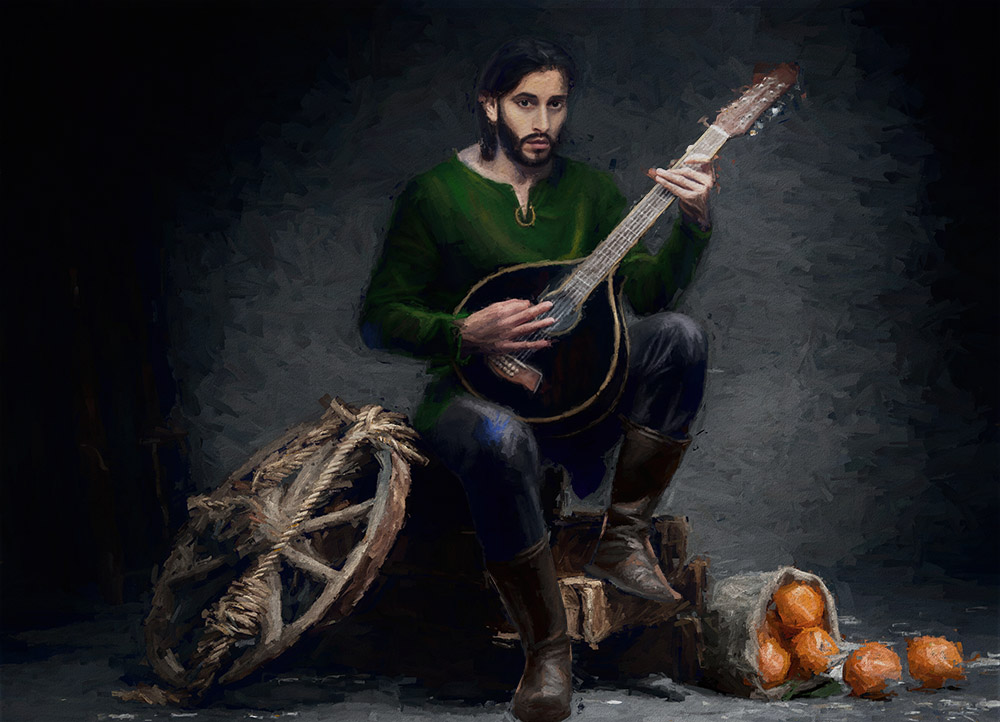
One individual was seated, radiating preoccupied malice but also a sense of authority. A thick, brown-skinned woman with reddish hair that fell in tight curls over her face as she jotted notes in a vast ledger.
I guess I’ve found Aruj… or did she find me?
“So,” the woman said without looking up, “Bolbec the Master sends me his apprentice. Are you any good?”
Hendry stammered, “Am I… good?”
“To eat,” said Aruj, “Do you taste good?”
“I wouldn’t… I don’t…”
“A joke, boy. I meant are you any good as a musician.” Aruj closed her ledger. “Because you’re too stringy to eat.”
Hendry laughed, more of a high-pitched giggle.
Aruj didn’t laugh.
She was waiting for an answer, Hendry realized. The effort of speaking to so many strangers at the docks had completely drained him, not to mention getting tossed and kicked along by his kidnappers like a street urchin’s rag ball. But again, what other choice did he have?
Forget escaping Bolbec. If I don’t speak now, I might not escape this room.
Hendry rasped, “As a musician –”
“Speak up, boy.”
“As a musician,” Hendry declared, “I believe I’m… slightly above passable?”
“Well,” said Aruj, “Transport to Algiers is a simple enough matter. But there is a question of risk. The wrath of the Inquisition. Aiding ‘Bolbec the Sinister. Isn’t that what they call him? Corrupter of youth.”
Hendry forced himself to smile. What would Bolbec say? “Well, Captain, my master has been known to inspire with his music, but appealing to all ages –”
“I’ve also heard him called ‘Bolbec the Black’. A liar, thief, and all-around scoundrel.”
“Who among us is without sin?” Hendry looked around the room and immediately regretted his words. “Not implying that any of you –”
Aruj leaned forward, her chair creaking.
“‘Bolbec the Sorcerer’, they call him.”
“Captain, I’m sure you know how the Church likes to exaggerate.”
“Did they exaggerate the plague in Florence? A quarter of the city dead, shortly after Bolbec played there.”
Of course… Florence.
Hendry swallowed, choosing his words carefully. “To be fair, my master’s music can tend towards the… eclectic. But he’s an old minstrel who would walk down the street without any pants if I didn’t help him dress in the mornings. Not any kind of… sorcerer.”
That seemed to satisfy Aruj. She sat back, nodding slowly.
“All right, slightly-above-passable apprentice to Bolbec the not-a-sorcerer. Play something for us.”
“Play…?”
“Yes, play. You know. Music.”
“Captain, I would love nothing more,” Hendry replied with a watery grin, “but I don’t have my lute.”
Aruj grunted. “One of the upsides of being a pirate, we keep plenty of musical instruments handy.”
She snapped her fingers and one of the sailors brought forth something that looked similar to Hendry’s own lute, but with a larger body, fewer strings. He ran his hands over the instrument, considering how he might adapt to the unfamiliar shape and size.
Something flaked off on his fingertips, reddish brown.
“Is that blood?”
Aruj shrugged. “One of the downsides of being a pirate, we are very critical of music, especially when played badly.”
Hendry swallowed, raised the strange blood-spattered instrument, and began to play.
With a well-deserved spring in his step, Hendry walked back toward the tavern. Not only had he secured safe passage to Algiers on the morning tide, but he also had a handful of coins in his pocket. And I have a pocket! The pirates had given him a coat (a few holes in back which he wisely chose not to examine closely). All in all, Hendry’s first solo performance was a resounding success.
Also not murdered. At least, not yet.
Hendry had started his performance with an Austrian folk tune— simple chords and childish lyrics. He was shaky, hungry, frightened… and he’d never performed alone. But he felt the shift immediately as the pirates softened their expressions, heads nodding, feet tapping. Hendry warmed up to the task, so his second song was a merry Spanish dance that had all the pirates clonking drunkenly around the room. And the third song, a wistful Irish ballad, brought more than one to tears, thinking back on the various homelands they fled.
Even Aruj scrubbed at one flinty eye by the end.
As the sun began to set, Hendry had trouble finding his way back to the poor quarter. At last, he spotted a few decorated buildings, looming out of the thickening fog like huge, formal ghosts. Soon enough he found the right street, where folks busily prepared for an open-air wedding feast.
The tavern came into view ahead. Hendry paused.
Is this my chance to escape?
He had a little money now. Money… but not his lute. Perhaps he could creep inside and get it? Yes, he would get his lute then leave Bolbec, finally. Let the old man sail off to Algiers. Meanwhile Hendry would pursue his own career as a minstrel, perhaps even enroll at the new Conservatory and–
A beefy fist shot out of the fog to hit Hendry in the gut.
He doubled over, fell to his knees on the muddy cobbles.
A large, scowling young man towered over him. Hendry expected more blows, or rough hands through his pockets (of course, those few coppers he’d just earned couldn’t last long) and was surprised when the scowling fellow walked off.
What was that–?
The second blow, a slap in the face, caught Hendry by surprise and sent him sprawling. This attacker was a young woman, looking even angrier than the young man. She also turned and walked away without a word.
“Ptu.”
Warm spatter smacked Hendry’s cheek.
His third attacker, spitting on Hendry while down, was a young boy. Fists on hips, he snapped at Hendry, “Ladro bastardo.”
Then he was gone as well.
Hendry scrubbed the spit from his sore face, rubbed at his sore stomach, and climbed to his sore feet.
Where have I seen those three before?
The tavern was more crowded than earlier, mainly wedding guests socializing before the evening feast. Bodies packed the courtyard, giving Hendry excellent camouflage as he observed Bolbec speaking with a tall, well-dressed Neapolitan man.
The bundle of instruments lay on the ground nearby.
Ever so slowly, Hendry wove a stealthy path through an obstacle course of lurching, hulking patrons. All I need is my lute. Three strides behind Bolbec, two. He reached the bundle, fished inside for the neck of his lute.
There!
“What are you doing, boy?”
Bolbec and the Neapolitan stared at Hendry.
“M-Master… I didn’t want to interrupt–”
Bolbec plucked Hendry’s lute from his hands and, as he did so often to Hendry’s annoyance, began adjusting the pegs. “Come here and let me introduce you to Signor Turatello. He is the… how do you say it again?”
“Il Padrone,” said the man sitting across, his voice a mixture of gravel and honey. He had a magnificent swoop of silver hair and attire as fine as any noble… but his large, scarred hands told a different story.
“Yes, that! Il Padrone,” Bolbec repeated, butchering the pronunciation. “A very influential figure in this neighborhood. Father of the bride in that big wedding.”
Turatello nodded. “The musicians we have, I no like. I tell them, ‘I have the shits with nicer sound’.”
“Wait,” said Hendry, “those musicians… did they just leave the tavern?”
“Oh yes,” said Bolbec, “you probably passed them in the street! Yes, quite mad!” He flicked his fingertips across the strings of Hendry’s lute, playing an off-key chord. “Well, signore, I don’t know how talented your arse is, but we’ll do our best.”
“We?” Hendry asked, suddenly very cold in his new coat.
Bolbec chuckled. “Signor Turatello is a very important man and his daughter’s wedding deserves the finest musicians in–”
Hendry quickly spoke. “A thousand pardons, Signor Turatello, we can’t play at your wedding.”
“We can’t?” asked Bolbec.
Turatello frowned. “Sorry, my English. Is no very good. You no play wedding?”
“Of course we’ll play at the wedding!” Bolbec insisted, “Look, boy, just because you don’t have any romantic prospects doesn’t mean–”
Hendry leaned toward Bolbec to hiss, “Master, do you remember our last wedding performance?”
Bolbec rolled his eyes, looked away. “So many performances, I can’t possibly recall the details of each.”
“Two people were stabbed.”
“Oh that wedding. That wasn’t my fault.”
“They were the bride and groom,” Hendry snapped, his patience beyond fraying, “They stabbed each other. During their vows.”
Bolbec sniffed. “Well, if any relationship is tending toward stabbing best get it out of the way early, I always say.”
“When do you say that?”
“I just said it. Weren’t you listening?”
“Excuse,” said Signor Turatello, “I already send away the old musicians. You no play, eh, we… how you say… shake hand.”
Hendry grasped the man’s scarred paw. “Yes, a handshake and we part ways on amicable –”
“No no no,” the man pulled away from Hendry, made a chopping gesture, one hand smacking down on the other, “Shake hand.”
Hendry swallowed. “Take our hands? Like… cut them off?”
“Che schifo!” Turatello exclaimed, “No, we are not Sicilians!”
Bolbec snapped his fingers. “Break! He means break our hands!”
Turatello beamed. “Si! Yes! Break hand!”
The old men clinked their glasses in celebration of a mutual understanding.
Hendry put his head in his unbroken hands.
Bolbec drained his cup, then smacked it down on the table. “Well, gather up the instruments, boy. We’re due on stage.”
“Now?” Hendry asked, voice cracking, nearly weeping, “But… we’re starving.”
“Oh, I ate. Didn’t you?”
Hendry closed his eyes. “No.”
“What were you doing all that time, boy?” Bolbec said, shaking his head, “Seriously, I don’t know what you’d do without me. Probably walk down the street without any pants if I didn’t help you dress in the mornings.”
Standing unsteadily upon a stage made up of barrels and planks, Hendry looked out over the wedding feast. Torches lined the sides of the street, tables in long lines upon the cobbles. His belly growled as he watched the wedding guests eat, and eat, and spill their food, and push their plates away or place them on the ground where dogs could gorge themselves on the leftovers.
Behind, Bolbec began to lay out his instruments, whistling softly.
“Remember, master,” said Hendry, “The Inquisition is looking for us. They’re all over the city. So, when we play tonight, we don’t want to seem… out of the ordinary.”
“Pthbbt.”
“What was that?”
“Yes, of course, boy,” said Bolbec. He sighted down the length of his pipe, gently blew a speck of dust from the finger holes. “I’m not a child.”
Hendry didn’t feel a need to respond to that.
“Master… what if they expect us to perform Italian songs?”
“Well I don’t speak the language, but I can sing at least twenty songs in Italian.”
“Really?”
“More or less,” Bolbec said with a careless shrug, “The trick is to roll the R’s just enough, otherwise a tender love song becomes a deadly insult about dubious parentage.”
I have to get away. I have to get away. I have to get away.
For the first hour of the wedding performance, Bolbec and Hendry played awfully. Constantly out of sync, each song a battle. Bolbec played wild and loose, suddenly changing keys, shifting tempo, leaping between styles even more recklessly than usual. Meanwhile Hendry struggled to keep the tune under control, like a small boy holding the leash of a drunken dancing bear.
The feast concluded and the tables were pushed back to make room for dancing. The bride and groom danced first. The pair were no older than Hendry, maybe even younger. A boy wearing his father’s suit. A girl wearing her mother’s dress.
Bolbec switched from pipe to fiddle and started singing in Italian.
“Non siamo estranei all’amore
Conosci le regole e anche io”
Hendry fumbled to play accompaniment and wondered what Bolbec was actually singing. Some wedding guests danced, but mostly they made perplexed faces. Signor Turatello looked particularly irate.
Maybe we should’ve let them break our hands.
As he wondered how they might survive the night, Hendry caught a flash of steel at the far end of the street. He craned his neck to get a better view over the heads of the celebrants, empty stomach sinking. Helmets and spears. Armored figures in formation, marching in their direction. So much for the Inquisition never coming to this part of the city. They began to move through the crowd, between the tables, between the dancers. Signor Turatello himself confronted the soldiers, flanked by several large individuals. A shouted argument broke out.
“Careful, boy,” said Bolbec, “you’ll break a string.”
Hendry realized he was strumming so hard that the skin on his callused fingers tore.
“I said be careful, boy –”
“Do you even know my name?”
“What?”
Oh, did I say that out loud?
Hendry was just as surprised as Bolbec, maybe more.
What brought it out now? Perhaps it was Hendry’s intense hunger, or their abysmal wedding performance under threat of bodily harm, or three years of disappointment tinged with terror, or the soldiers of the Inquisition coming closer, or the combination of all these.
But suddenly I can just… speak.
Hendry turned to face the old man, still playing.
“My name,” Hendry repeated, “Do you know it?”
Bolbec snorted, “Of course I do!”
“And?”
“Well…” the old man fumbled, lowering his fiddle. Then his face crinkled into a clever smile, “What’s my name? You always call me ‘master’, maybe you don’t even know–”
“It’s Bolbec, of course!” cried Hendry, practically punching his lute. “Bolbec the Infantile!”
“Haven’t heard that one –”
“Bolbec the Cursed!”
If he was completely honest, Hendry felt as if he’d never played so well in his life as he did then. He wove a complex melody, layered one rhythm upon another upon another, stamping to the music and screaming out in tempo.
“Bolbec the Oblivious! Bolbec the Selfish! Bolbec the Laughingstock! Bolbec the –”
Hendry glanced sideways… and stopped mid-chord.
Everyone had frozen. Not a ‘brawl at a wedding between soldiers and guests’ type of frozen. Not even a ‘look the musicians are yelling at each other’ type of frozen. No, this was an unnatural ‘bodies locked in mid-stride, faces twisted in mid-grimace’ type of frozen.
Inquisition soldiers locked arms with wedding guests like grappling Greek sculptures. A table hung at a dangerous angle, tumbling glasses and sliding plates paused. Drops of spittle hung shining in shouting mouths.
Hendry whispered hoarsely, “What… what did you do?”
“Me?” Bolbec asked, hand on heart, “Oh no, I wasn’t the one playing. Speaking of which, I’d strongly suggest that you continue.”
Even as the thrum of Hendry’s last note died away, the frozen tableau started to shift, bodies finished their stride, fists continued their arc, faces writhed into new grimaces.
Hands shaking, Hendry raised his lute to play once more.
Bolbec casually added, “Just be careful. An off-key note now and… well, you recall the chickens.”
Hendry hesitated, swallowed, then set to strumming, not even thinking about what song. He just let his fingers dance over the lute strings, like living things separate from himself.
Everyone froze once more.
“Wait, this is… magic?” said Hendry. He vaguely realized how stupid it sounded, stating the obvious. But he couldn’t stop himself. “You’re a real magician? And now… I am as well?”
Bolbec laughed. “What did you think we’ve been doing for the past three years?”
“Well… music.”
“All music has the power to change the world!” Bolbec declared, broadly gesturing towards the paralyzed crowd, “Ideally for the better, but sometimes… well, you know.”
“Bolbec’s Luck.”
“What’s that?”
“That’s what I called it. When strange things happened.” Hendry suddenly squinted at the old man. “Wait, every disaster… it was all on purpose?”
“Oh I wouldn’t say that. I have the ability to control the magic, but often I just choose not to. Let the music go where it will, that’s what I always say.”
“I thought we were talking about magic, not music.”
“There’s a difference?”
“But… Florence,” rasped Hendry, “A quarter of the city dead –”
Bolbec shook his head. “Plague was already running amok in Florence when we arrived. If we hadn’t played, it would have been three-quarters dead.”
“Oh.”
Very slowly, Hendry’s expression of shock became a smile.
“This is our chance! The Inquisition can’t get us! We can escape! We’ll go to Aruj at the docks, and in the morning it’s off to Algiers!”
Bolbec sighed. “Boy, I was never going to Algiers.”
Hendry frowned in confusion. “Me? Alone?”
“A fresh start in a faraway land. And with your newfound voice! Why, just think of all the things you could do!”
“But… master… how are you going to escape the Inquisition?”
Bolbec spread his hands, eyebrows raised.
“You were never planning to escape,” Hendry realized.
The old man sighed again, smiled sadly. “Running, hiding… I feel that I’ve exhausted all the possibilities in that genre. But don’t worry about me, boy. You said it yourself. This is your chance.”
Hendry glanced between the Inquisition and Bolbec.
“Hendry,” the old man said, voice slow and thick, “Go. Share your music with the world, give them a glimpse of all the things they never thought possible. And if they don’t like it –”
“Too bad,” Hendry finished.
Still playing, he walked toward the edge of the makeshift stage. One more step… and I’ll be free. At the last moment he turned.
“Surely we have time for one more song, master?”
Bolbec grinned, tucking his fiddle under his chin. “Boy, there’s always time for one more song.”
Hendry grinned as well, even wider.
“And one… two… three…”
Hendry and Bolbec played.
The tales of their performance vary from person to person, but many of the details are the same. The wedding guests had no awareness of being frozen. One moment they were fighting the Inquisitors, then the soldiers all appeared to be locked in place. And as a bawdy tune filled the street, everyone felt deliriously happy. They danced around the frozen Inquisitors, draping them with flowers, showering them with wine.
Hendry and Bolbec played.
The tune changed and the Inquisitors were released as well. Immediately they threw down their weapons and joined in the dance. Armor was shed, articles of clothing exchanged between soldier and citizen, before long no one could tell who had begun on which side. Signor Turatello juggled swords, clad in greaves and a shimmering dress. The groom wore a full breastplate much too big for his tiny frame. The bride wore a helmet which covered her eyes. The two of them danced energetically in a clapping ring and kissed as the song reached its end.
Hendry and Bolbec played.
One song became two, two became five. They played songs which brought strong men to blubbering tears and songs which made old spinsters somersault out of their chairs to frolic upon the tables. They played songs which made the cobblestone streets thrum, songs which summoned snow out of the sky, songs which made the night crackle and the stars whirl. Song after song, Hendry and Bolbec played, and laughed, and bent the world like warm clay, filling each listener’s heart with wonder and terror in equal measure.
You wouldn’t know it to look at him, but the old man strutting up to the stake where they would burn him was none other than Bolbec the Great, Bolbec the Trickster, Bolbec the Magician, Bolbec the Master.
That’s a lot of big names… but somehow not big enough.
An Inquisition soldier read the old man’s crimes aloud from a lengthy parchment, first in Spanish, then Italian, then English. Meanwhile, Bolbec waved to the crowd enthusiastically, both hands manacled. He danced a jig, twirled, and bowed.
Standing near the back of the crowd, Hendry munched on a piece of wedding cake as big as his head.
So now what? On to Algiers? Or… elsewhere?
“Never heard anything like it.”
Hendry turned to find the young woman who’d slapped him standing at his shoulder. One of the angry wedding musicians.
“The music at the wedding the other night, it was… amazing,” she said, “You’re the apprentice, right?”
Hendry prepared to run.
The young woman grabbed his sleeve. “Wait! We’re not here to cause trouble. We’d like to join your troupe… if you’ll have us.”
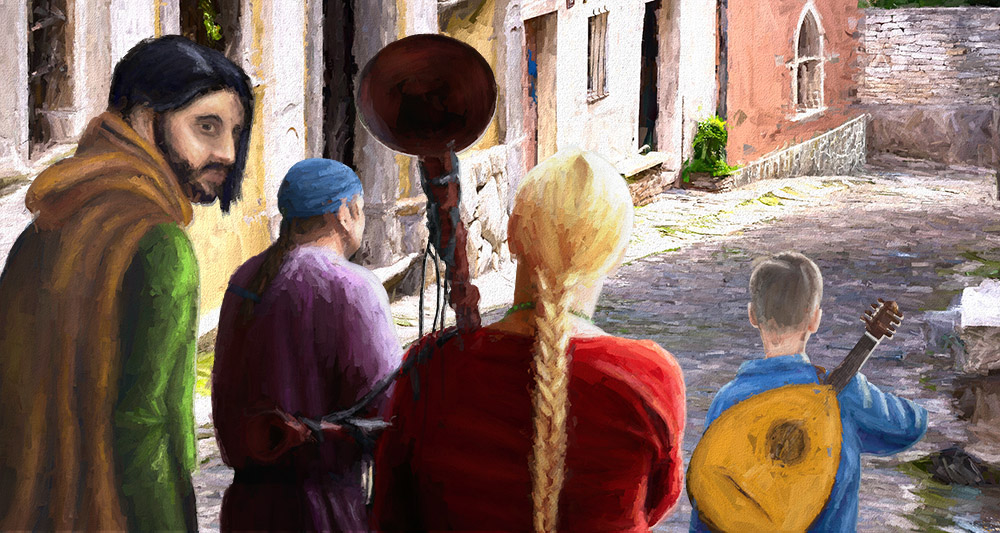
My… troupe?
Momentary panic subsided, Hendry noted that all three of his attackers were there. The large young man and small boy stood behind the woman, instruments in hand, traveling packs over their shoulders.
The boy pointed at Bolbec. “When is he gonna do it?”
“Do what?” Hendry asked.
“The magic,” hissed the boy, “The escape.”
Hendry smiled and shrugged.
Up front, Bolbec jogged over to the soldier calling out his crimes, peering closely at the parchment. “Oh, ‘subversive’… I like that word. Feels like I’ve made a real difference. Now don’t slouch. Good posture, chin up. Find your voice, eh?”
Hendry chuckled, addressed the musicians, “If we’re going to play together, we should establish clear roles. Which of you is the oldest?”
The young woman raised her hand.
“Congratulations!” Hendry said, beaming, “You get to be the adult!”
“The what now?” asked the young woman.
Hendry turned on his heel and started out of the square with long, swinging strides.
His troupe caught up with him. “We no stay?”
“We no stay,” Hendry replied.
He glanced back once to find that Bolbec had climbed up the firewood mound, addressing the crowd like a hawker selling miracle cures. “Come closer!” he called out, “And I shall bestow upon one and all the true power of music!”
Two blocks away, the boy caught Hendry’s sleeve. “It no make you mad?”
“What, boy?”
“The Inquisition. They burn your master.”
Hendry pursed his lips and thought about that before answering. What would Bolbec say?
The Inquisition is a dark, self-important smudge on the pages of history. We, however, stand on the precipice of a great change. With music, we will save the lost, we will elevate the low! We will show people vistas both terrible and wondrous! We will open the doors of possibility!
That’s what Hendry wanted to say, but it seemed like a lot, and it all sounded very adult. So instead, he looked his new troupe directly in the eye and summed it up nicely.
“Thbbbt.”


